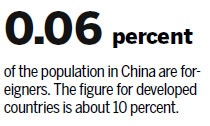More talent back from overseas, but work still needs to be done
By Luo Wangshu (China Daily) Updated: 2015-05-25 07:27While China's rapid economic growth provides major appeal to draw homegrown talent back from overseas, further legal development remains essential to attracting more, according to Liu Xuezhi, vice-president of the Chinese Academy of Personnel Science.
"The number of overseas returnees is highly correlated with China's GDP," Liu said.
His studies found that the number of overseas returnees has been skyrocketing since 2000, a time when China's GDP began to experience rapid growth.
The number of Chinese students studying overseas has increased since then. But the number of returnees saw dramatic growth seven or eight years later - since about 2007 or 2008 - which matches China's economic growth, Liu said.
He estimates that the growth will continue for at least three to five years.
To continue to encourage Chinese to return, Liu said it's important to strengthen legal conditions at home.
"Overseas returnees don't care much about wages or the work environment. They come back hoping to join the country's development and to make history," Liu said.
President Xi Jinping has stressed law-based governance, indicating the country's legal-building will be improved further.
According to Wang Huiyao, president of the Center of China and Globalization, a Beijing think tank, China has only about 0.06 percent of foreigners, while in developed countries the figure is about 10 percent. In other developing countries, it's 1.6 percent, Wang said, adding that China is experiencing an economic transition to which international talent is able to contribute.
Migration is another part of the picture, in Wang's view.
"China ranked No 4 on the list of most migrants to other countries last year. It is not a small player in global migration, and the country is keen to attract international talent," he said.
China has enjoyed the benefits of internal migration in the past two decades. During the urbanization drive, migrant workers who moved to cities have made tremendous contributions to the economy, and it is now time for the country to move forward to enjoy the benefits of international migration, he said.
According to the United Nations, 232 million people moved out of their native countries in 2013, 155 million in 1990, 178 million in 2000 and 214 million in 2010.
"Developed countries have particularly enjoyed the benefits that migration brings to technology and the economy," Wang said, suggesting that Chinese authorities focus more attention on establishing a system to attract more international talent.
The center published a report on Chinese international migration in March, analyzing its effects from various perspectives.
According to Liu, China places priority on attracting Chinese back from overseas. Overseas returnees account for 90 percent of the international talent working in China, he said.
Howard Duncan, executive head of the Metropolis Project, an international network that studies migration patterns, said the government should be more confident about attracting young, active international talent to work in China, adding that it already hires many retired professors and researchers.
luowangshu@chinadaily.com.cn

- Govt encourages people to work 4.5 days a week
- Action to be taken as HIV cases among students rise
- Debate grows over reproductive rights
- Country's first bishop ordained in 3 years
- China builds Tibetan Buddhism academy in Chengdu
- Authorities require reporting of HIV infections at schools
- Typhoon Soudelor kills 14 in East China
- Police crack down on overseas gambling site
- Debate over death penalty for child traffickers goes on
- Beijing to tighten mail security for war anniversary







